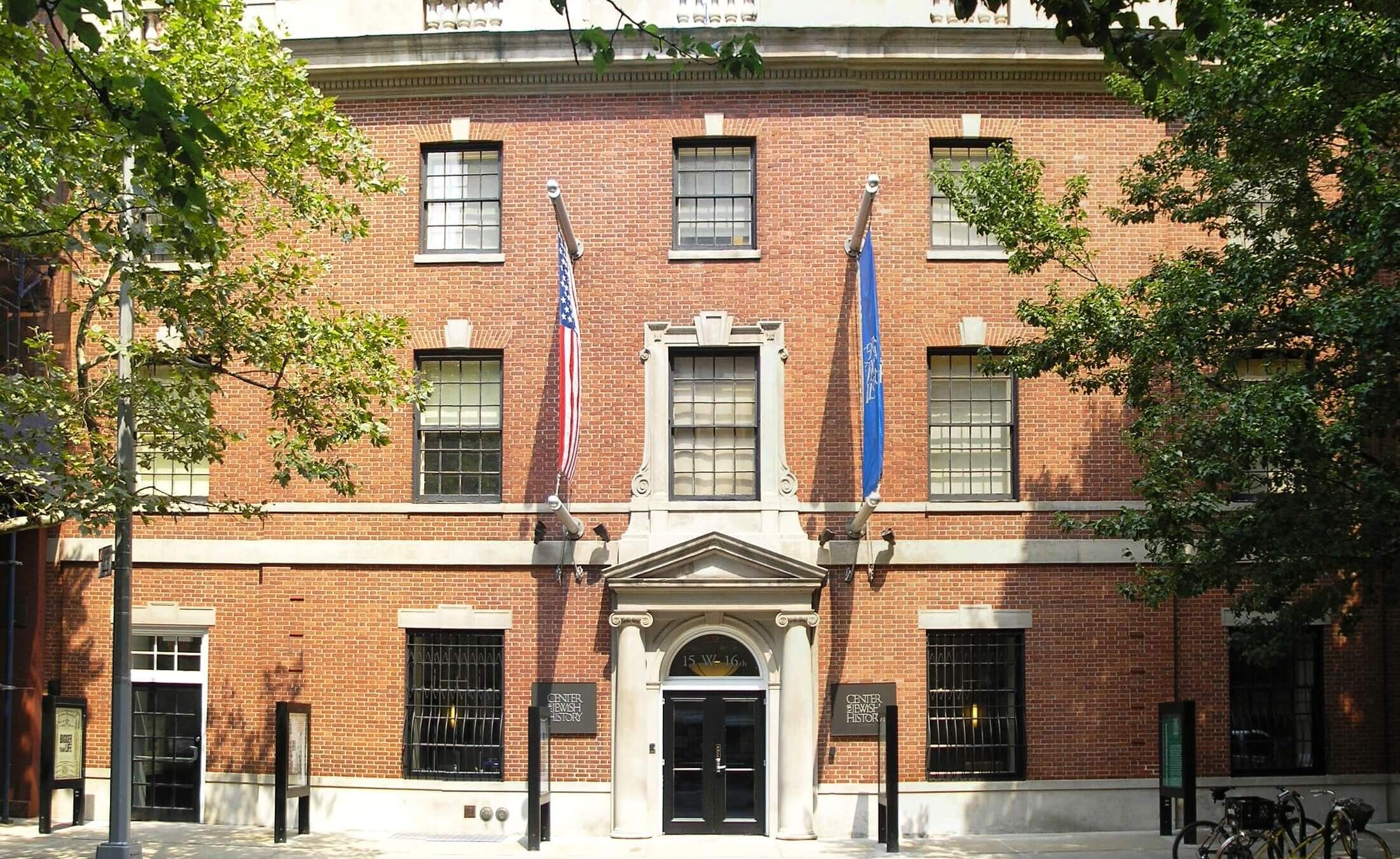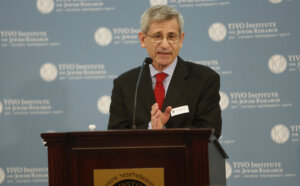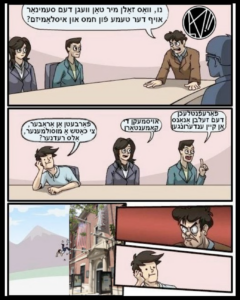A Yiddish institution will discuss Hamas — many in the Yiddish world say they’re promoting propaganda
The YIVO webinar ‘The Origins and Ideology of Hamas’ exposed a rift in the Yiddish world. Its CEO says critics have too narrow an idea of their mission

The Center for Jewish History in New York, where the YIVO Institute for Jewish Research is based. Photo by Gryffindor/Wikimedia Commons
Shortly after the YIVO Institute for Jewish Research announced a new webinar series on Hamas and its ideological link to Nazism and Soviet antisemitism, they were flooded with Instagram comments, accusing the 99-year-old institution of straying from its mission and serving as a mouthpiece for Israeli propaganda.
YIVO, which started in Vilna, Poland (now Vilnius, Lithuania), and has been based in New York since 1940, states that it exists to “preserve, study, share, and perpetuate knowledge of the history and culture of East European Jewry worldwide.” Some see this mandate as being incompatible with hosting the program The Origins and Ideology of Hamas. The three-part Zoom event, beginning Feb. 26, is set to feature Israeli historian Benny Morris and German political scientist Matthias Küntzel, among others, and will examine the “deep affiliations” of European antisemitic propaganda and the militant Islamist group that governs Gaza.
“Cancel this program. It’s a shonde— a slap in the face of YIVO’s past, present & future,” wrote one Instagram user. On “Meme Loshn,” a popular Yiddish meme page, the kerfuffle over Instagram comments and the decision not to feature any Arab or Muslim speakers was dramatized in the form of a comic strip.
For many who have connections to YIVO, the Hamas program seemed to deepen the rift between Jews in the Yiddish world critical of Israel’s war in Gaza and the legacy institutions they rely on, which they see as having become increasingly pro-Israel since Oct. 7.
“I sort of did a double take at first,” said Yankl (Jake) Krakovsky, 32, a former YIVO student who, in November, presented his Yiddish puppet show Labzik: Tales of a Clever Pup there. “It seemed sort of outside the purview of what I understand to be YIVO’s focus.”
After the initial surprise, Krakovsky said, he had a feeling of “dread and skepticism.”
He had seen Yiddish institutions like the Yiddish Book Center put out statements in support of Israel following the Oct. 7 attacks by Hamas. (YIVO’s brief statement said it stood “united with the people of Israel at this perilous time” and condemned the terrorist assault.) But YIVO’s choice to do a whole series about Hamas was the first time he had seen one of these organizations put resources toward what he calls an “ideological, propagandistic aim.”
Moishe Holleb, 34, a Yiddishist and writer based in Crown Heights, who moved to New York after attending YIVO’s summer program, said that, in the aftermath of Oct. 7, discourse in larger, institutional Yiddish spaces, which include many leftists and anti-Zionists, criticism of Israel has become taboo.
“I had these conversations in YIVO with students and teachers while I was a student there last summer,” Holleb said. “It’s a completely different climate now.”
Not in a tribe
YIVO’s CEO Jonathan Brent and Jeffrey Herf, a professor emeritus at the University of Maryland who curated the Hamas series, claim that YIVO’s critics misunderstand its intent. They deny that the series is pro-Zionist, or even necessarily pro-Israel, as much as it is a sober — perhaps even dry — presentation of history inspired by a previous collaboration.
“We want to raise the level of discussion,” Herf said. “We’re not in a tribe.”
Brent, who published Herf’s 2009 book Nazi Propaganda for the Arab World and who has researched Soviet antisemitism as a Stalin scholar, said that, after Oct. 7, he saw a lack of attention paid to the roots of Hamas’ ideology, something he hopes the series will correct. Those who believe that this topic is outside YIVO’s remit, Brent said, have a narrow view of what the organization does and of its history.

After World War II, for example, Max Weinreich, one of YIVO’s founders, wrote Hitler’s Professors, a book about how Nazi ideology infiltrated academia. In doing so, Brent said, Weinreich made a statement that YIVO was no longer constrained by geography, but would be defined by the most urgent issues confronting Jews. The series also makes sense for YIVO, Brent argued, because of its archive on the Holocaust and because Israel’s groundwork was laid by Eastern European Jewish intellectuals.
Brent said he anticipated angry Instagram comments, but was also shocked by what he sees as the misinterpretation of YIVO’s mission as well as the historical anti-Zionism many associate it with. Brent said there’s a difference between anti-Zionism before WWII — largely philosophical — and anti-Zionism today, when the state of Israel is a reality and is often accused of being a racist and imperialist project.
For Herf, who said he is a proud Democrat, something has changed in liberal thought with regard to Israel. Many of the “Instagram idiots,” as he calls them, are ignorant of the Nazi-Islamist collaboration of the 1940s, he said.
“In 1945, ’46, ’47, ’48, if you were a leftist, the grandparents of leftists who live in Brooklyn today, you would be a fervent, probably, a fervent Zionist and you would view the Arab Higher Committee and the opposition to the establishment the state of Israel as an aftereffect of Nazism,” Herf said. “One of the strangest things in the last 30 years and now (and it became evident after Oct. 7) is that there are so many people, young and old, who call themselves progressives and call themselves leftists, or left liberals or whatever, and refuse to focus on the nature of Hamas.”
Asked why they didn’t invite Arab or Palestinian experts on Hamas, as many on Instagram suggested, Herf said: “This is a free country. And we are not obligated to present the views of our enemies.”
Brent said that the Palestinian scholars he’s followed in recent months “have been more of advocates than scholars,” and that their position is already the dominant one on college campuses and pro-Palestinian rallies.
“When Oct. 7 happened, and it was clear, the extent of the brutality, the true, unequivocal savagery and the indiscriminate nature of it, those people who are today chanting ‘from the river to the sea,’ saw this as payback,” Brent said. He said that many in the group denouncing the program were silent about Hamas’ travesties and are now claiming that he and Herf have no empathy for the victims in Gaza.
“How do they know we don’t have empathy for the victims in Gaza? How do they know that we don’t mourn that as well?” Brent asked

‘The archive is all about people not agreeing’
Critics of the Hamas series disagree that the YIVO program, connecting European antisemitism to a terrorist group in the Middle East, is bringing anything new to the discourse, characterizing it as a rehash of widely disseminated talking points — or even Israeli hasbara.
“It’s like manufacturing consent for the genocide,” said Holleb, who co-founded the cafe the Pink Peacock, a queer anti-Zionist Yiddish cafe in Glasgow, Scotland, which closed after antisemitic harassment from “self-described leftists.”
“It feels like the line that we’re supposed to walk away with after this event series is like, ‘Yeah, we’re the good guys. We’re fighting the Nazis once more. Hitler is alive and well in Gaza. And if we bomb enough civilians, then we’ll kill him too.’”
(None of the people interviewed for this article said they support Hamas, which killed over 1,200 people on Oct. 7 according to Israeli authorities, but some believed their atrocities didn’t justify Israel’s response, which has so far killed 28,000 people according to the Gazan health ministry.)
“If they’re trying to talk about the role of European antisemitism in this struggle, it’s a very important story,” said Jenny Romain, 61, who worked as YIVO’s sound archivist for 13 years, from the 1980s to the 1990s and identifies as a “YIVO Jew.” But she thinks that projecting Western antisemitism onto the Arab world is misguided.
Romaine views the Hamas program as at odds with the environment she came up in, when YIVO was staffed largely by “super gritty” Holocaust survivors of various political stripes and levels of religious observance. The program also stands in contrast, she said, to the incredibly pluralistic nature of YIVO’s archive, which contains some 24 million items.
“The archive is all about the diversity of voices and people not agreeing,” Romaine said. “My experience is 99% of people who are tuned into Yiddish, or a lot of us, are really trying to build a post-Zionist reality.”
If the event goes on as planned, Romaine wrote in an email to YIVO, she worried that the place she loves would be “complicit in the murder of thousands in the name of Jewish racial superiority.”
‘Flooded with propaganda’
Krakovsky says that he and many of his colleagues now feel uneasy about their future as Yiddish culture workers, as the institutions that hold the materials and resources they depend on adopt stances they disagree with. (Holleb, for his part, canceled his plans to attend YIVO’s Yiddish program this summer. He’ll be studying in Berlin instead.)
Krakovsky, who also teaches at the Yiddish Book Center, added that Jewish organizations like YIVO risk disaffecting not only some longtime Yiddishists, but the rising generation like his students, who largely oppose Israel’s actions.
If “organizations want even a chance of retaining these passionate, brilliant young people, then I think they’re going to need to take their moral and political perspective seriously for once,” he said.
Brent said he was concerned about losing some of these younger people, but that “historical truth” had to be his main concern. He hoped some of the people who objected would attend the Zoom series and invited “responsible” criticisms once it was over.
“But I can predict that rather what is going to happen is that we’re going to be flooded with propaganda,” Brent said. “We’re going to be flooded with: ‘This is immoral. This is not recognizing the rights of so-and-so, this is not recognizing the nature of the oppression.’ In other words, instead of scholarly investigation, we’re going to be flooded with value judgments that have been brewed up by a combination of Soviet and left-wing thinking in the United States over the last 40, 50 years.”
The series now has over 1,000 registered to attend, with Brent predicting it may turn out to be YIVO’s most popular program in recent history. Asked if he would be open to a seminar on Jewish anti-Zionism, Brent said, “we can arrange for that, no problem.”
Correction: A previous version of this article stated that Yankl Krakovsky is a fellow at the Yiddish Book Center. He has worked there as a Resident Assistant for their Steiner Summer Yiddish Program.





















